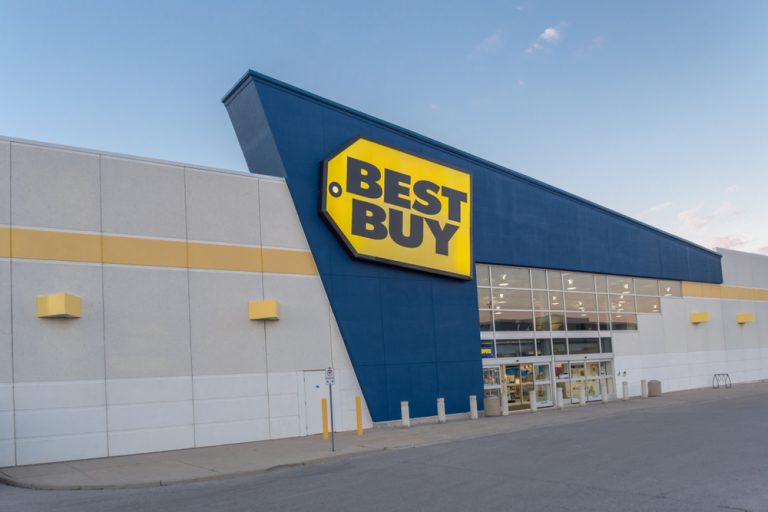Best Buy (BBY) continues to face challenges as flagging consumer demand led to another quarter of declining sales. The retailer posted its 12th consecutive quarter of negative same-store sales growth, with overall results missing Wall Street expectations.
Third-Quarter Earnings Fall Short
Best Buy reported a 2.9% decline in same-store sales year-over-year, worse than the expected 0.92% drop. The company’s net sales came in at $9.45 billion, below the estimated $9.63 billion, and adjusted earnings per share reached $1.26, narrowly missing the forecast of $1.29.
CEO Corie Barry attributed the shortfall to a mix of macroeconomic uncertainties, consumer hesitation ahead of holiday sales, and distractions in the run-up to the U.S. elections.
“Fourth-quarter sales [are] a sequential improvement,” Barry told reporters. “We like what we’re seeing early in the holiday—a little bit better than our expectations.”
Key Performance Metrics
Best Buy’s performance varied significantly across product categories:
- Appliances: Sales dropped 14.7%, more than the expected 7.5% decline.
- Entertainment: Fell 18.8%, significantly underperforming the 4% expected decline.
- Consumer Electronics: Declined 5.8%, worse than the forecasted 2.72% drop.
- Computing and Mobile Phones: Grew 3.8%, slightly ahead of the 3.5% estimate.
- Services: Increased by 6%, exceeding the 5.83% forecast.
International sales also disappointed, with a 3.7% decline compared to the 0.57% expected drop.
Revised Full-Year Outlook
The company has revised its full-year projections downward:
- Same-store sales are now expected to decline between 2.5% and 3.5%, compared to a prior range of 1.5% to 3%.
- Revenue is forecast at $41.1 billion to $41.5 billion, down from the earlier range of $41.3 billion to $41.9 billion.
- Earnings per share guidance has been adjusted to $6.10 to $6.25, from $6.10 to $6.35 previously.
AI and New Technologies Offer Hope
Despite current challenges, Best Buy is banking on new technologies to drive growth. The retailer recently launched Copilot+ PCs, which leverage advanced AI models, with roughly 40 products exclusive to its stores. Barry views AI as a long-term opportunity, describing it as “a two- or three-year steady replacement and innovation combination.”
Jason Bonfig, Best Buy’s chief merchandising officer, highlighted the gradual rollout of AI features across platforms like Microsoft, Apple, and Google, particularly with the anticipated end-of-life support for Windows 10 in 2025. He expects AI-enabled products to gain traction as consumers upgrade and replace devices.
Challenges Ahead
The decline in categories such as appliances and entertainment highlights ongoing consumer shifts toward experiences rather than goods, inflationary pressures, and a lack of compelling new products. Analysts, including Telsey Advisory Group’s Joe Feldman, anticipate a return to growth by early 2025 as the replacement cycle kicks in for products purchased during the pandemic boom.
Market Reaction
Best Buy stock fell 7% in early trading following the report. Year-to-date, shares have risen nearly 19%, lagging behind the S&P 500’s 25% gain.
Best Buy’s latest results underscore the retailer’s struggle to adapt to shifting consumer behavior and broader economic challenges. While AI and new technologies may buoy growth in the coming years, the company faces immediate hurdles in stabilizing sales and navigating a tough retail environment.


